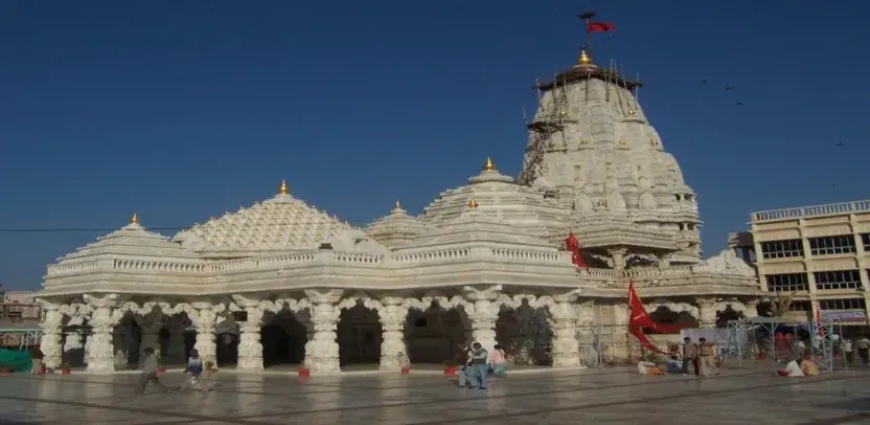Explore the Divine Beauty of Mount Abu Ambaji Journey
Discover the spiritual charm and scenic beauty of Mount Abu Ambaji, a serene journey through Rajasthan and Gujarat, blending temple visits, hill station views, and peaceful experiences.

India is known for its rich heritage, spiritual sites, and scenic hill stations. Among the many beautiful destinations that combine nature and devotion, the journey from Mount Abu to Ambaji stands out as a unique experience. Nestled at the border of Rajasthan and Gujarat, this route not only offers stunning views of the Aravalli hills but also gives travelers a chance to immerse themselves in peace and prayer. Whether youre a pilgrim, a nature lover, or someone simply seeking tranquility, this journey promises a soulful and memorable experience.
Mount Abu Rajasthans Serene Hill Retreat
Mount Abu is Rajasthans only hill station, located at a height of about 1,220 meters above sea level. Unlike the rest of the state, which is known for deserts and forts, Mount Abu is lush and green, with cool weather and refreshing winds. This small hill town is surrounded by the Aravalli hills and dotted with lakes, temples, and colonial-era buildings.
One of the most popular spots here is Nakki Lake, a calm and picturesque place where tourists enjoy boating and evening strolls. The backdrop of hills and the changing colors of the sky make this place incredibly photogenic. The nearby Sunset Point and Honeymoon Point offer mesmerizing views of the valleys and are perfect for romantic walks and quiet reflection.
Another must-visit in Mount Abu is the Dilwara Temples, a group of Jain temples famous for their stunning marble architecture. The detailed carvings on the ceilings, pillars, and domes reflect the skill of artisans from centuries ago. Even if youre not deeply religious, the atmosphere of peace and beauty here will touch your heart.
Exploring the Road to Ambaji
From Mount Abu, Ambaji is just about 50 kilometers away, making it a convenient short trip. The drive itself is scenic, with winding roads, green valleys, and occasional temples and shrines along the way. The journey allows you to gradually descend from the hills into the spiritual plains of Gujarat.
As you travel, youll notice the landscape change, and the pace of life slow down. Small villages and forest patches come into view, giving you a glimpse of rural life in the region. For many travelers, this road trip becomes a time of quiet reflection, away from the noise of cities.
Ambaji The Sacred Shakti Peeth of Gujarat
Ambaji is one of the most important pilgrimage sites in Gujarat and is part of the 51 Shakti Peeths spread across the Indian subcontinent. It is believed that the heart of Goddess Sati fell here, making it a highly sacred place for devotees of Shakti (the Divine Mother).
The main attraction here is the Ambaji Temple, dedicated to Goddess Amba. The temple is unique because it doesnt have an idol of the goddess. Instead, a sacred symbol called the "Shree Yantra" is worshipped. Thousands of devotees visit the temple every month, especially during full moon days and during the Bhadarvi Poonam festival, which sees grand celebrations.
The temple complex is large, clean, and full of spiritual energy. Devotees offer flowers, coconuts, and prayers, while the priests perform traditional rituals. The chants, the fragrance of incense, and the overall atmosphere make visitors feel a deep connection with the divine.
Culture, Faith, and Local Life
Both Mount Abu and Ambaji have a strong cultural identity, and their people are deeply rooted in traditions. In Mount Abu, youll find a mix of tribal communities and locals who have lived in harmony with nature for generations. They are warm and welcoming, often sharing folk tales about the hills and the temples.
In Ambaji, the devotion of the people is visible in their daily lives. From early morning aartis (prayers) to evening fairs, everything revolves around the temple. Local markets are filled with spiritual souvenirs, traditional sweets, colorful bangles, and fabrics. The blend of Rajasthani and Gujarati culture can be felt in the food, clothing, and language.
If you happen to visit during a local festival, youll witness vibrant dances, music performances, and community feasts that highlight the unity and joy of the people here.
Best Time to Visit Mount Abu Ambaji
The best time to plan your trip to Mount Abu and Ambaji is between October and March. During these months, the weather is cool and pleasant, ideal for sightseeing and temple visits. The summer months can get a bit warm, especially in Ambaji, but Mount Abu remains comparatively cooler due to its elevation.
Monsoon, from July to September, brings fresh greenery and mist to Mount Abu, making it look even more beautiful. However, the roads can get slippery, so cautious travel is advised during the rains.
Accommodation and Travel Tips
Both Mount Abu and Ambaji offer a range of accommodation options, from budget guesthouses to mid-range hotels. In Mount Abu, many hotels offer views of the hills and lakes, while Ambaji has several dharamshalas and hotels near the temple.
Its best to book in advance, especially during festive seasons. Carry light woollens for Mount Abu even during summer, as the nights can be chilly. If you plan to walk a lot or take part in rituals, wearing comfortable shoes and modest clothing is advisable.
Local food in both places includes traditional thalis, snacks like kachoris and samosas, and sweets such as mohanthal and jalebi. Most eateries are vegetarian due to the religious importance of the area.
A Journey to Remember
Traveling from Mount Abu to Ambaji is not just a physical journeyits a spiritual one. It takes you from the misty hills to sacred plains, from quiet lakes to vibrant temples. It allows you to pause, reflect, and feel a deeper connection with nature and faith.
Whether you're lighting a diya at the Ambaji Temple or sitting by Nakki Lake watching the sun go down, every moment of this journey feels like a prayer. The peace you carry back from here stays in your heart long after the trip ends.
This Mount Abu Ambaji experience is perfect for families, solo travelers, and spiritual seekers alike. Its a reminder that in the heart of India, devotion and nature continue to thrive side by side.










































